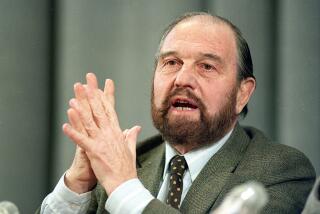Miller’s Double-Agent Claim Disputed by FBI
- Share via
A top FBI official testified Wednesday that he once told counterintelligence agents in Los Angeles--including accused spy Richard W. Miller--that the FBI would never approve using one of its own agents in any kind of double-agent operation against the Soviet Union.
The testimony in Miller’s espionage retrial by FBI Agent David Major, director of intelligence and counterintelligence for the National Security Council at the White House, was aimed at Miller’s claims that he was acting in an unauthorized double-agent role when he became involved with convicted Soviet spy Svetlana Ogorodnikova in 1984.
Major said he lectured new counterintelligence agents in Los Angeles on Feb. 17, 1982, while a member of the FBI’s counterintelligence training unit. A sign-up sheet indicated that Miller was one of the agents who attended the six-hour session.
“I explained to them that running a double agent is a balance,” Major said. “If an FBI agent would volunteer to be a double agent, he would have to establish his bona fides by passing so much information that the damage would outweigh the possible gain. In no type of operation would we use an FBI agent as a double agent.
“I told them they may think it’s an inventive new idea, but it’s not,” Major added. “It’s been looked at. It won’t be approved. There were no circumstances that would justify running an FBI agent as an agent himself.”
Miller, 49, was arrested Oct. 2, 1984, on charges of conspiring with Ogorodnikova and her husband, Nikolai, to pass secret FBI documents to the Soviet Union. The Ogorodnikovs pleaded guilty last June 26 to conspiracy and are now in prison. Miller’s first trial ended in a deadlocked jury last November.
Before his arrest, Miller admitted passing documents, but claimed he did so only to appear vulnerable to Soviet recruitment. He says he expected the FBI to approve a plan to travel with Ogorodnikova to meet Soviet intelligence officials in Warsaw. Since his arrest, he has denied that he ever passed secrets, saying he confessed only because he was mentally and emotionally exhausted by FBI questioning.
Major testified Wednesday that FBI agents sometimes run double-agent operations against the KGB, usually using private American citizens. He said FBI operatives are sometimes provided with “feed material” consisting of classified documents secretly approved in Washington for release to the Soviets.
“I told them that classified documents (for double agents) are identified and approved for passing in Washington. In effect, they declassify them, a record is made that it is declassified, but there is no change on the document,” Major said.
Major testified as the sixth prosecution rebuttal witness in Miller’s second espionage trial, now in its concluding stages.
Most of the other rebuttal testimony has been directed against claims by Ogorodnikova that she had an affair with another FBI agent, John Hunt, before ever meeting Miller--charges that have been denied by Hunt and branded as a confusing side issue by the prosecution.
The question of Hunt’s involvement with Ogorodnikova has led to a series of courtroom disclosures about his various undercover operations as head of the double-agent program for the Soviet counterintelligence squad in Los Angeles--including one assignment involving a Soviet exchange student.
FBI Agent Robert Patton testified Tuesday about an undercover operation in October, 1982, when he and Hunt joined Ogorodnikova and the unidentified student at a dinner party with a group of Russian immigrants at the Russian Tea Room in the Beverly Center.
Intelligence sources said FBI approaches to Soviet exchange students in the United States are viewed as a highly sensitive area. They said the testimony is an example of the price the government is willing to pay in terms of disclosing secret operations in the continuing effort to convict the first FBI agent ever charged as a spy.
More to Read
Sign up for Essential California
The most important California stories and recommendations in your inbox every morning.
You may occasionally receive promotional content from the Los Angeles Times.









